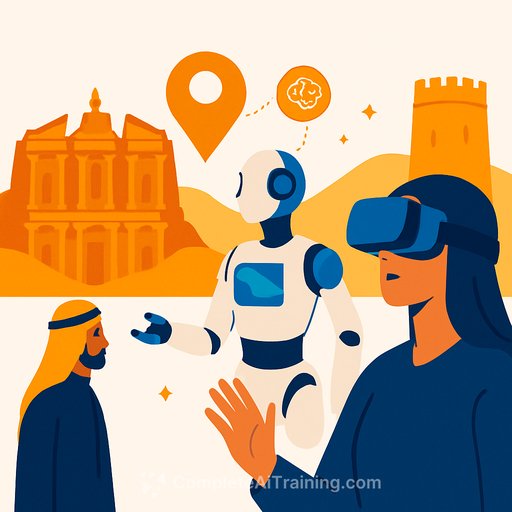Saudi Arabia Leverages AI and Immersive Tech to Boost Tourism
Saudi Arabia is actively integrating smart technologies like artificial intelligence (AI), augmented reality (AR), and virtual reality (VR) into its tourism sector. This push aims to transform visitor experiences and support the Kingdom’s broader economic diversification strategy. Flagship projects including Neom and the Red Sea Project are spearheading this tech adoption, positioning Saudi Arabia as a rising global tourism destination amid a recovering industry expected to contribute $11.7 trillion to the global economy by 2025.
Under the Vision 2030 framework, tourism is a key non-oil growth driver. The National Tourism Strategy targets 150 million visitors annually by 2030 and seeks to increase tourism’s GDP contribution from 3% to 10%.
Smart Technologies as Strategic Enablers
Saudi Arabia is embedding smart tourism technologies strategically across its major destinations. This includes AI for personalized trip planning, biometric systems for smoother immigration processes, IoT-enabled environmental controls in accommodations, and AR/VR experiences at cultural and entertainment sites. These technologies help manage visitor growth, improve quality, and differentiate experiences.
Smart tourism applies advanced digital tools throughout the tourism value chain to enhance visitor interaction, optimize operations, and promote sustainable destination management. The concept ties closely to “Smart Destinations” that use technology to create immersive and eco-friendly experiences.
Key Drivers and Industry Outlook
Significant investments in smart infrastructure—such as AI-enhanced airports and digital visa platforms—along with a young, tech-savvy population and focus on sustainability are accelerating Saudi Arabia’s tourism transformation. The sector isn’t just recovering post-pandemic; it’s generating its own momentum by adopting smart tourism as a lever for economic diversification and innovation leadership.
Personalized and Adaptive Experiences
The tourism industry is shifting from digital to cognitive tourism, where advanced systems anticipate and adapt to traveler behavior in real time. In Saudi Arabia, intelligent platforms go beyond basic booking apps to deliver personalized services that respond dynamically to visitor preferences.
Recent data shows 87% of Saudi travelers use generative AI tools like ChatGPT and Gemini for trip planning, with 46% employing AI assistants to find activities and 31% optimizing itineraries using these technologies.
Destinations powered by smart systems provide seamless, immersive experiences that increase satisfaction and encourage repeat visits. These technologies also support sustainability by optimizing energy use, mobility, and waste management.
Flagship Projects Integrating Smart Systems
- Neom: Uses AI for personalized visitor engagement and immersive digital experiences.
- Red Sea Project: Incorporates IoT sensors to monitor environmental conditions and operational efficiency.
- Diriyah: Combines heritage preservation with interactive digital storytelling tools to enhance cultural tourism.
- Qiddiya and New Murabba: Embedding smart systems to continuously refine tourism offerings.
Future plans include autonomous electric vehicles, smart utility management, and centralized digital platforms for booking accommodations, transportation, and experiences.
The Role of Data and AI
Real-time data integration—from IoT sensors to biometric inputs—enables destinations to deliver truly adaptive experiences. This approach benefits both travelers, who receive personalized service, and operators, who gain actionable insights to manage resources efficiently and reduce friction.
AI-powered chatbots and service robots are increasingly used for customer service and routine tasks, improving efficiency and consistency, especially in budget accommodations. Infrastructure systems powered by IoT and cloud technologies monitor environmental conditions in real time, supporting sustainability and comfort.
Challenges to Address
Despite progress, challenges remain. Many advanced AI, AR/VR, and IoT solutions originate outside Saudi Arabia. Collaborations with international partners and local capability building are essential to ensure smooth integration.
Clear regulations on data governance, cybersecurity, and technology standards will be critical for consistent implementation and alignment with national goals. Upskilling programs and international partnerships are needed to fill talent gaps in the growing smart tourism ecosystem.
Delays in deploying major infrastructure such as nationwide 5G, smart airports, and cloud systems may slow down real-time applications crucial for projects like Neom and the Red Sea.
Looking Ahead
With nearly 75% readiness for new technology adoption expected by 2025, Saudi Arabia is on track to integrate smart tourism deeply into its strategy. Coordination between stakeholders and supportive policies will be key to overcoming current barriers and positioning the Kingdom as a leader in innovative, sustainable travel.
For product developers interested in AI applications and smart technology integration, exploring AI courses and certifications can provide valuable skills to contribute to these emerging markets. Resources like Complete AI Training’s latest AI courses offer practical knowledge tailored to industry needs.
Your membership also unlocks:






